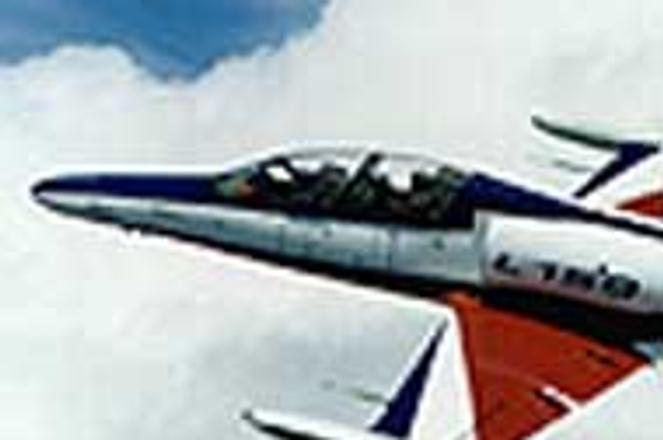The L-159 'fighting bomber', produced by the Czech Aero Vodochody firm, is one of the four contenders for a contract from the Slovak Defence Ministry.photo. Courtesy Aero Vodochody
Defence Minister Pavol Kanis confirmed on May 23 his ministry's intention to purchase 35 to 50 subsonic jets to replace the country's aging Soviet-made Su-22 and Su-25 'fighting bombers,' which provide close air support to ground forces. While Kanis said that the purchase of the subsonic jets would serve to upgrade the country's shoddy air force, not everybody was happy with the decision.
Military experts have said that Slovakia's military forces are in dire need of upgrades in areas other than aircraft. One high ranking US Air Force expert said on May 22, under the condition of anonymity, that buying the jets would be a mistake, and that Slovakia should instead invest into the purchase of new radar systems.
"It would be a political and economic mistake for Slovakia to become committed to these jet planes before it solves [more pressing issues] such as interoperability and language training issues in the Membership Action Plan [a NATO programme for non-member countries]," he said. "As a rule, NATO and US officials have tried to point Slovakia away from [the country's existing] 'platform' radars towards the C3ISR [advanced three dimensional radar] systems, including air surveillance radars, border security systems, and command and control."
But Kanis has other ideas. Instead of paying large sums for the advanced radars now (which would make Slovak airspace fully compatible with NATO standards), he told The Slovak Spectator on May 23 that the Ministry would go ahead with the purchase and bank on NATO's providing free radars to the country once Slovakia gained membership in the alliance.
"We've decided to purchase the new planes," he said. "Just to improve [rather than purchase new] radar systems would cost about 1.5 billion Slovak crowns [$32,000,000]. We have to think strategically - after we enter NATO, perhaps we'll get the radars for free as the Hungarians did."
Kanis was referring to the radars Hungary received last year, compliments of NATO, during the alliance's bombing raids in Yugoslavia. However, NATO officials warned that the Hungarians, as the northern neighbour to Serbia, had been in a special situation which called for the radars to be installed immediately. Whether Slovakia will also receive such infrastructure upgrades is uncertain, they said.
"NATO's infrastructure budget is very limited [$806 million, to be divided amongst all current 19 NATO countries, as well as some candidate countries]," said Vladimír Jakabčín, the head of the NATO and Western European Union section at the Slovak Foreign Affairs Ministry. "All expenses thus have to be agreed on by all NATO members and given only to projects useful to the needs of the alliance as a whole."
Other observers also found Kanis' decision to be faulty. Ivo Samson, a security analyst with the Bratislava-based Slovak Foreign Policy Association, said: "Although Kanis' thinking [that NATO would eventually purchase the radar systems for Slovakia] may come true, I don't think it's good for Slovaks to view NATO simply as a donor to our needs."
Samson added that the majority of the Slovak population still knew little about NATO, and that educating the public about the relationship between the alliance and Slovakia could take 15 years. "People still believe NATO will build new airports, railroads and highways for us. It could happen, but in no way can this be the reason to enter the alliance. Rather, we should enter only because we share the values of NATO."
Although Samson questioned Slovakia's motivation for joining NATO, the decision to purchase the jets rather than the radar is not expected to harm the country's western ambitions.
"This issue of 'planes or radars' can't in any way damage Slovakia's integration into NATO," said a Czech military official who wished to remain anonymous. "For the Czechs, as a NATO member, it isn't important whether Slovakia first buys planes or radars. What is important is that Slovakia is compatible with other NATO members and that the country continues to progress towards achieving alliance membership."
Kanis said that his ministry would open a tender by November of this year to contract a company from which the jets would be purchased. Defence Ministry spokesman Pavol Vitko said on May 30 that four jet producers - Aero Vodochody (Czech Republic), BAE Systems (UK), Mapo (Russia) and Sokol (Russia) - had so far been contacted by the ministry. "All those producers received our letter, but I won't tell you which companies responded because the deadline to do so is May 31."


